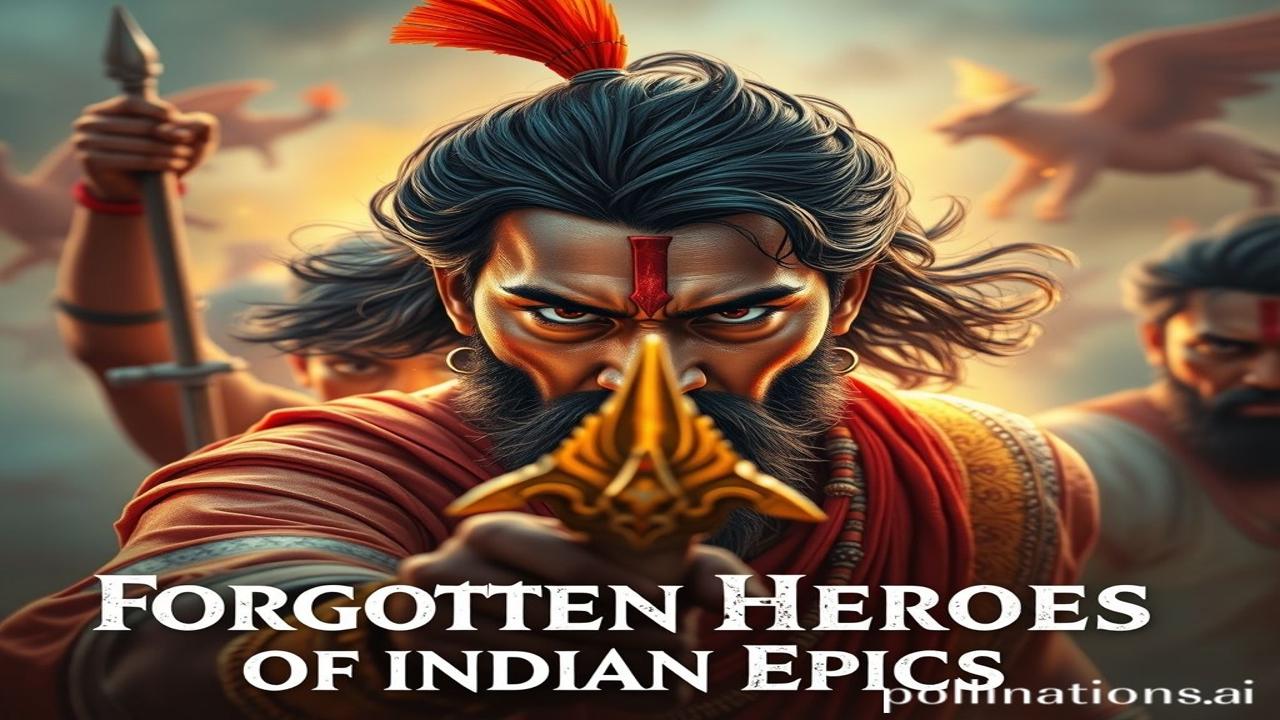Waqt Ki Dhool Mein Dabi, Bharat Ki Amar Kahaniyan: Unsung Heroes of Indian Epics
Kabhi socha hai, jab Diwali ki deepak jalte hain, ya Ramlila ki goonj hawa mein phailti hai, toh kuch aisi aatmaein bhi yaad aani chahiye jinhe itihas ne thoda kam yaad rakha? Hum Ramayana aur Mahabharata ke naam toh sunte hain, lekin unme chhupi, aam logon ki extraordinary kahaniyan aksar bhool jaate hain. Chaliye, aaj waqt ki dhool ko jhaad kar, un forgotten heroes ko yaad karte hain.
The Grand Tapestry: Indian Epics and Their Significance
What exactly are these Indian epics, and why do they matter so much? Simply put, they are the soul of India. The Ramayana and the Mahabharata, penned centuries ago, are not just stories; they are reservoirs of philosophy, ethics, and Bharatiyata. They offer a glimpse into the societal structures, political systems, and everyday life of ancient India.
The Ramayana, attributed to Valmiki, narrates the story of Rama, an ideal king, and his epic journey. The Mahabharata, attributed to Vyasa, delves into the complex relationships and the Kurukshetra War between the Pandavas and the Kauravas. Both epics, passed down through generations orally and then written down, have shaped our cultural identity and continue to influence our values even today. These events happened between 3100 BCE to 800 BCE approx. and are core to our dharohar and pehchan.
Beyond the Royals: The Common Folk Who Made a Difference
Let’s step away from the kings and queens for a moment. What about the aam aadmi, the ordinary people who played crucial roles in these grand narratives?
-
Kevat (Ramayana): Remember Kevat, the boatman who ferried Rama, Sita, and Lakshmana across the Ganga during their exile? His simple act of devotion and selfless service proved pivotal to Rama’s journey. He wasn’t a warrior or a prince, but his nishtha (dedication) was unmatched. Imagine the scene – Ganga flowing, the scent of incense from nearby temples, and Kevat, a humble man, changing the course of destiny.
-
Eklavya (Mahabharata): Eklavya, the tribal archer, whose skill surpassed even Arjuna’s. Despite being denied formal training by Dronacharya because of his low birth, Eklavya’s self-discipline and unwavering commitment led him to become a master archer. He sacrificed his thumb as guru dakshina, showcasing the power of self-belief and the injustices prevalent in the caste system. Picture him in the dense forest, practicing tirelessly, the rustling leaves his only companion.
-
Vidura (Mahabharata): Vidura, born of a handmaiden, was a wise and just counselor in the court of Hastinapur. He consistently stood up for righteousness, even when it meant opposing the Kauravas. His moral compass and insightful counsel often went unheeded, ultimately contributing to the tragic events of the Mahabharata. Think of him amidst the opulent palace, his voice of reason a stark contrast to the scheming whispers around him.
-
Shabari (Ramayana): Shabari, an elderly tribal woman, whose unwavering devotion to Rama led her to offer him berries she had tasted herself to ensure their sweetness. This act of selfless devotion transcended social barriers and highlighted the importance of bhakti (devotion). Envision her simple hut in the forest, the aroma of berries filling the air, her heart overflowing with anticipation of Rama’s arrival. “Ma Rukmini ne aaj naye kapde pehne, kyunki mandir mein utsav tha…” just like Shabari must have dressed in her best to receive Rama.
Echoes in Modern India: Keeping the Flame Alive
These unsung heroes may not be as widely celebrated as the main protagonists, but their stories continue to resonate in modern India. Their acts of courage, selflessness, and devotion inspire us to strive for righteousness and to recognize the inherent worth of every individual, regardless of their social status.
We see their influence in our values of seva (service), tyag (sacrifice), and bhakti. Many social initiatives are named after them, keeping their memory alive. Their stories are often retold in folk tales and dramas, ensuring that their legacy continues to inspire future generations.
Did You Know? Myth vs. Reality
Myth: Only gods and kings can influence destiny.
Truth: The actions of ordinary individuals, like Kevat, Eklavya, Vidura and Shabari, can have a profound impact on the course of events. Their stories remind us that every individual has the potential to make a difference.
The Sounds of Silence, The Scent of History
Imagine the ancient ghats of Ayodhya, the sound of the Ganga flowing, the scent of sandalwood and incense filling the air. Feel the rough texture of the clay pots used by Eklavya for his archery practice. Hear the rustling of leaves as Shabari searches for the sweetest berries in the forest. These sensory experiences connect us to the past and make these stories come alive.
Antaryatra: A Final Thought
These forgotten heroes teach us that true heroism is not defined by power or privilege, but by character, compassion, and commitment to dharma. Their stories are a reminder that even in the grandest epics, it is often the unsung heroes who truly shape the course of history.
“कर्मण्येवाधिकारस्ते मा फलेषु कदाचन” – Karmanye vadhikaraste Ma Phaleshu Kadachana – (You have the right to perform your prescribed duty, but you are not entitled to the fruits of action.) This timeless shloka from the Bhagavad Gita encapsulates the spirit of these unsung heroes, who acted with selfless devotion, without seeking recognition or reward. Their legacies continue to inspire us to embrace our own dharma and to strive for righteousness in all that we do.
